-
THE LOOMING STORM (Doug Yue 2017)
DOUG YUE: THE LOOMING STORM (2017)
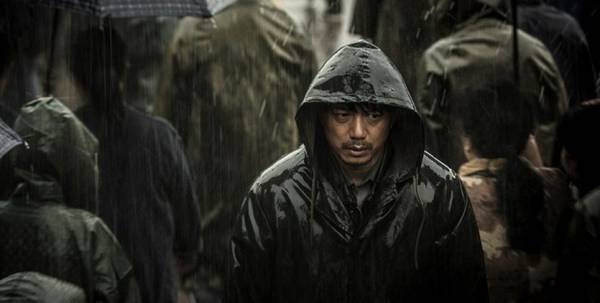
DUAN YIHONG IN THE LOOMING STORM
Theme: "A man who is laid off from a steel factory desperately wants to chase a serial killer in a small city in Southern China."
This is a mood piece and a psychological study on top of a meandering police procedural whose "police" lack real skin in the game and may not have their head screwed on quite right. A better title might be the French one, Une pluie sans fin (but the Mandarin one is , Bàoxuě jiāng zhì,"Blizard is approaching"), because the rain, and later worse, storm, doesn't just loom during the main action of this film but pour down continually on the gloomy dark decaying factory and on protagonist Yu Guowei (Duan Yihong), who is in charge of security, only a minor role at the factory. His main job is catching out petty thefts. But his dream is to be a full-scale detective who can unlock the secrets of the serial killings going on in the region. Details of these are threaded through the narrative, but Yu Gowei's relation to them is shaky. Weaving genre and psychological study with political commentary in a rich and complex and visually pleasing way, much of this film is quite marvelous, even if it's a bit overlong, but toward the end it loses direction, failing to reach a satisfying finale.
The main action takes place in 1997, time of the death of Deng Xiaoping and the handover of Hong Kong, and also when China is shutting down a lot of underperforming factories and casting out most of the workers, a sequence of events talented first time director Doug Yue is registering quiet protest to, along with allusion to the general brutality and crushing effect on the common man of modern China's rapid "progress." It's suggested that many of the employees, once fired, are cast out of their humble dwellings as well. Yet Yu Guowei gets an award as Model Worker of the Year at an annual meeting of the factory for zealously catching thieving workers, and gives an impromptu acceptance speech full of hope. Is this indication of a sudden change of affairs, or of Yu Guowei's cluelessness? Or has he imagined this whole episode? The shakiness of his hold on reality is continually, subtly, referred to. But finally his pursuit of a scrawny individual he intuits is the killer leads to dire consequences. The award ceremony may be real, but it is intensely ironic in relation to the brooding landscape and dire fates of the factory and its workers.
At the outset Yu Guowei appears ten years later in quite a different mode. He has just been released from pirson for an unspecified crime. Eventually we find out what it was. This opening, the present time of the film, is 2008, a time of natural disasters. When Yu Guwei is asked to spell his name on release, for an I.D., his explanation is that it's "yu" for "unnecessary remnants," "guo" for "nation," and "wei" for "glorious." So at the outset there is an allusion to how the "glorious nation" has turned many of its citizens into castoff remnants. And he is one of them.
But in the rained-on main action, Yu Guowei gets minor involvement in investigating serial killings, examining the body of a brutally murdered woman as in so many noir mystery genre films. But there are actual police assigned to the case, primarily Chief Zhang (Du Yuan). Yu Guowei is only called in to give evidence of any absent workers from the factory: but this gives birth to his delusion that he is one of the case investigators.
To bolster Yu Guowei's confidence, but only in a comically inadequate way, he has a dumb but cute assistant, Xiao Liu (Zheng Wei), who clumsily follows him around, gumming things up but praising his brilliance and calling him "maestro." This assistant is deluded too, if in a more benign way. But his eagerness and his boss's indifference to him lead to dire consequences.
Unlike them is the dance hall prostitute, Yanzi (Jiang Yiyang), whom Yu Guowei befriends mainly in hopes that she will have clues about the killer. In a way she is deluded too, notably in thinking that Yu Guowei cares about her. But her dream is practical: to go to Hong Kong and have her own beauty parlor. She gets a humble beauty parlor, and Yu Guowei helps her with that. But she says "There won't be any customers in this weather." We don't see any. Jiang Yiyang's sad, droopy beauty and tawdry elegance give this film much of its atmosphere and beauty - along with the magnificently brooding lineaments of the dark satanic factory, which seems like a decayed building out of Kidnapped even though it is still nominally functioning. The constant rain makes it seem like a grand outhouse of hell.
A long (doubtless too long) late-middle section follows the dreary relationship between Yu and Jiang, the asexual obsessive and the wan dreamer. Does she imagine he cares for him, though they never have sex? Probably not really, certainly not when she discovers he is not mooning over her but spying on her, imagining she may have a relationship with his imaginary killer.
Yue is a subtle and sophisticated weaver of mood, but he needs to find his way to a tighter plotline and clearer action. The Looming Storm melts away in the rain, because when it returns to 2008, it seems to undercut too much of the (intentional) unreliable narrative that has come before, so the viewer can't get a grip on the action at all, and the film's complexities seem to overwhelm it. But Doug Yue is clearly a new director to watch.
The Looming Storm/ 暴雪将至, Bàoxuě jiāng zhì, 120 mins, debuted at Tokyo Oct. 2017, and premiered in Paris 14 June 2018, but its French release to cinemas as Une pluie sans fin ("Endless Rain"") was 25 July: there were good reviews in major journals (AlloCiné press rating 3.5). . Screened for this review as part of the 2018 New York Asian Film Festival, where it shows 9 July .
Last edited by Chris Knipp; 06-20-2019 at 07:19 PM.
-
THE BLOOD OF WOLVES (Shiraishi Kazuya, 2018)
SHIRAISHI KAZUYA: THE BLOOD OF WOLVES (2018)
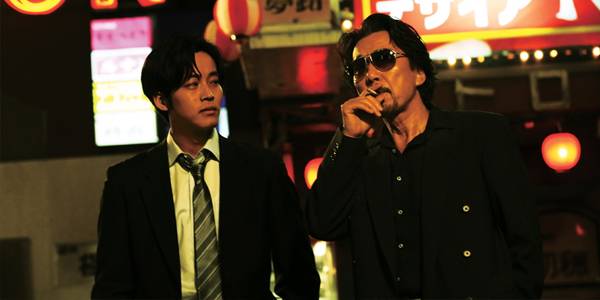
TORI MATSUZAKA AND KÔJI YAKUSHO IN THE BLOOD OF WOLVES
An old genre reappears
"The yakuza movie used to bestride the Japanese film industry like a colossus," wrote Max Schilling of The Japan Times,"but now clings to its margins." Perhaps it should stay there. Of course diehards sometimes take a crack at the genre again, Schilling notes, Like Takeshi Kitano with Outrage Coda "but a true revival has yet to come." Kitano has done more interesting such films already, even if one watches them in vain for hints of deeper meaning that isn't really there.
The Blood of Wolves features a sleazy bent cop, Shogo Ogami, played by Kôji Yukusho, who is accompanied by a new rookie partner, a recent Hiroshima University graduate called Shūichi Hioka (Tori Matsuzaka), a pretty boy type who holds back his jujitsu skills and also the fact that he's from Internal Affairs and sent to lay bare Ogami's corruption - and get hold of his diary, packed with insider information. Hioka's relation to Ogami is interesting at times, as it swings passionately between shock and admiration. Yukusho and Matsuzaka both have juicy roles, and make the most of them.
There is plenty of violence, right off the bat, including a castration, a clipped off finger, victims fed pig offal, a severed head in a urinal, and the like. The two cops are getting in the way between two rival gangs - Kakomura-gumi and the Odani-gumi - you know the drill. It's slickly done, and there are occasional surprises, particularly coming from a young female pharmacist. There is also an occasional austere-sounding voiceover.
Shiraishi Kazuya's The Blood of Wolves is "more of a homage than a revamp," suggested Schilling. It is a cop thriller based on Yuko Yuzuki's novel, but the director has acknowledged his greater model is Kinji Fukasaku's Battles Without Honor and Humanity, a five-part 1973-74 series. "It would be interesting," Film Alert 101 speculates, "to know just how [The Blood of Wolves] made its way into the festival circuit." Maybe to remind us how the non-festival circuit world lives? Really Blood of Wolves, for all its genre thrills, is far too familiar, and too long. But still, at times, it's pretty great, too.
The Blood of Wolves / 孤狼の血 (Korô no chi, "Blood of solitary wolf"), 126 mins., debuted at Udine Far East Festival 24 Apr. 2018, opening in Japan 12 May. It showed in the Nippon Connection festival in German in May and at Sidney in June. It was screened for this review as part of the NYAFF at Lincoln Center where it shows July 2 at 9:15 pm.
Last edited by Chris Knipp; 02-16-2019 at 01:30 PM.
-
ONE CUT OF THE DEAD//KAMERA O TOMERU NO! (Shin'ichirô Ueda 2017)
SHIN'ICHIRÔ UEDA: ONE CUT OF THE DEAD//KAMERA O TOMERU NO! (2017)
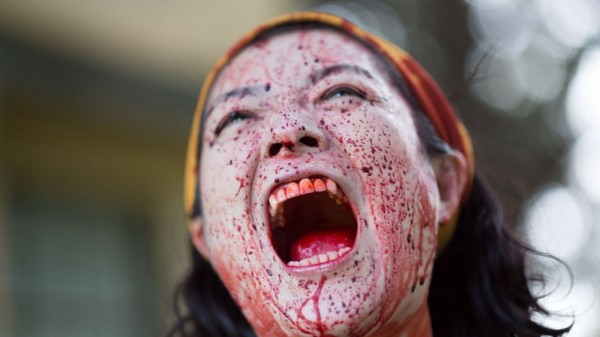
HARUMI SYUHAMA IN ONE CUT OF THE DEAD
TRAILER
Careful with that axe!
This movie plays in an original and hilarious manner with the zombie movie genre. It is also a virtuoso display of self-reflection, a making-of a making-of, and it's in three parts. The first part is the film you saw on TV. Later, we learn that it was shot as the first episode for a new all-zombie channel, in a live broadcast single take - no time for edits - so "one cut" has a double meaning. The premise is this: A director whose claim is being "fast, cheap, but average," is making a zombie movie with a small crew in an abandoned water filtration plant in a remote location. During a break caused by the director's discontent (to put it mildly) with the female young lead Chinatsu (Yuzuki Akiyama) for flubbing 42 takes of the scene where she's threatened by her zombified bf, Ko (Kazuaki Nagaya), real zombies begin to attack, and mayhem ensues. After that the director returns and, heedless of the danger and doom coming on the cast, shoots the attacks of the real zombies with delight, maniacally yelling "Action!"
All this movie was in fact made with virtually unknown actors and on a tiny budget, and part of its charm lies in its revelation of Japanese teamwork and artisanal ingenuity.
The whole first segment, ending with the title and credits for "One Cut of the Dead," is a tour-de-force nearly forty-minute take. That cheap zombie movie shoot that turns real is just the beginning.
Part two, set one month earlier, loses the energy and ferocity of the first part, but modulates into a homier, more self-conscious mood. It's from the point of view of the director, Higurashi (Takayuki Hamatsu) and shows his family life, then how he got hired to do the movie, and its peculiar demands. We learn that his wife Nao (Harumi Syuhama) is an actress who's stopped acting, but comes to his shoots, and that his daughter, Mao (Mao) who comes for the rehearsals and later is recruited into the cast, has a crush on the young man in "One Cut's" cast, Ko, apparently a heartthrob, who emerges as a prima donna. What this segment lacks in excitement it makes up on gemütlichkeit. It humanizes the whole affair and takes us to the human stories behind the making-of that is to follow.
At the last minute, the actress who is to play the older woman can't make it, and Higurashi's retired actress wife Nao steps in. The actor who is to play the director can't make it either, and Higurashi is forced to play the make-believe director as well as the real one. One of the crew members who turns into a zombie, we learn, is an alcoholic who needs a drink to stop his hands from shaking, but if he has one, risks passing out. Another cast member (and make-believe crew member) has something like irritable bowel syndrome, and must be reassured that there will be "port-a-loos" brought in, as the facility has no restrooms.
Now we begin the third part, the complete "making of," of the film we saw in part one, which we fully appreciate now that we understand, as we must, that this has to be by-the-skin-of-your-teeth guerrilla filmmaking at its most demanding. It's a tribute to Ueda that as everything goes wrong in the shoot and the cast brilliantly improvises, you half expect something to go so terribly wrong that a cast member will actually get his or her head or arm hacked off. There are multiple axes in play.
The third segment is the most important, and the most complete, but our appreciation of it entirely depends on our having seen the film as it appeared broadcast on TV. Not only do we see the cast running around in "One Cut of the Dead" T shirts moving equipment, splashing blood, and inserting fake chopped-off heads and limbs. We also observe the tribulations of the cast member with the loose bowel problem and the effort necessary to make him appear when the script calls for it. The director must personally revive the drunken actor.
The hilarity is lightened by the production's success in spite of every malfunction and missed cue. As the TV people watch remotely, things repeatedly go wrong. Yet the cast's improvisations are more gonzo and original than the original script - to which they always return, like a masterful pianist picking up the theme of a concerto after the cadenza. The drunk's wobbly condition makes him an excellent zombie, once they can get him standing up. It's nice to see the prima donna turn into a team player who improvises brilliantly, and it is astonishing to find out why the director's wife is so impressive and even scary as the older woman in the cast.
One Cut of the Dead /カメラを止めるな! Kamera o tomeru na! ("Do not stop the camera!"), 93 mins., opened in Japan 9 Nov. 2017. It gained international notice at Udine and has been in nine international festivals, including the New York Asian Film Festival, as part of which it was screened for this review, showing 13 Jul. 2018 at 10:20 p.m.
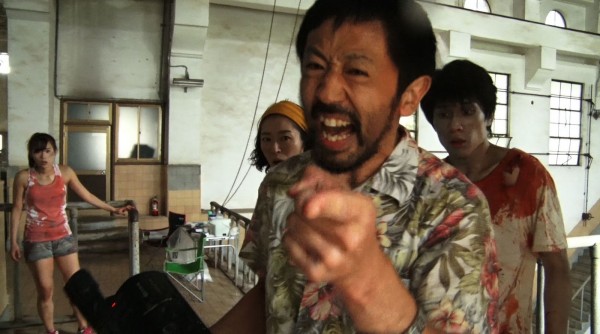
TAKAYUKI HAMATSU, FOREGROUND, IN ONE CUT OF THE DEAD, WITH YUZUKI AKIYAMA, HARUMI SYUHAMA, KAZUAKI NAGAYA
Last edited by Chris Knipp; 07-03-2018 at 01:15 AM.
-
CROSSROADS: ONE TWO JAGA (Nam Ron 2018)
NAM RON: CROSSROADS: ONE TWO JAGA (2018)
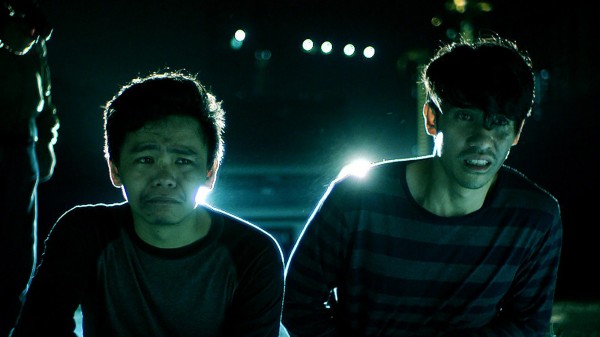
Eeny meeny, mene mene
Malaysian filmmaker Nam Ron’s third feature is a messy little movie all seen through yellow filters, that aims to show that corruption is everywhere. A longhaired guy carries out his more powerful father's dirty work, starting with burning the body of a worker who died in a fall. He takes a kid along with him who wants to be tough. His older brother hides his sister at a sleazy hotel while arranging for her to return home, because she hates working here. She has lost her passport. Their are other subplots, too many. The main focus is a corrupt cop going around with his new young partner, only 23, whose face is twisted into a scowl of distaste at all the bribes and payoffs he sees. The rookie tries to remain pure, but he turns out to be a loose canon whose desire to play by the rules leads only to tragedy.
The framing scene shows the rookie, but we don't know him yet, after a beating by interrogator. The next shot is of kids playing a Malaysian "Eeny, meeny, miny, moe" game that separates cops from robbers, both emblematic of how the two are indistinguishable, and referring to the boy, Jaga, who will be caught up in all the mess. The director, Nam Ron, deserves credit for juggling his excessive number of small plot lines clearly enough, for those who are capable of taking them all in. There are too many, though, and a third of them should have been left on the cutting room floor. The trouble is, we don't care deeply about anybody except, briefly, for the rookie cop, who, like everybody else, betrays out trust.
The film uses Indonesia’s Ario Bayu (Buffalo Boys) and the Philippines’ Timothy Castillo (Neomanila) playing illegal immigrants. (NYAFF festival blurb.)
See David Pountain's review on FILMDO (penned at the Udine Far East Festival).
Crossroads: One Two Jaga/One Two Jaga, 80 mins., debuted at Udine 22 Apr. 2018, also showing at Shanghai 16 Jun. It was screened for this review as part of the New York Asian Film Festival, where it shows 29 Jun.
Last edited by Chris Knipp; 07-08-2018 at 11:25 AM.
-
MICROHABITAT (Jeon Go-woon 2017)
JEON GO-WOON: MICROHABITAT/SO-GONG-NYEO (2017)
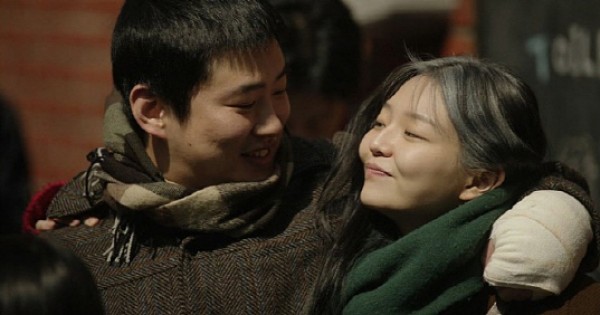
AHN JAE-HONG AND ESOM IN MICROHABITAT
A winter's tale
Microhabitat is a Korean debut feature by a woman director who's part of an independent collective called Gwanghwamun Cinema. It's a unique, meditative character study as well as a series of vignettes that serve as a small panorama of a variety of Seoul lifestyles and economic situations. But it doesn't come off as quite so cold and formal as that sounds. It's governed by the unpredictability of Miso (Esom, Lee So-young), an independent, freewheeling woman of 31. When we first meet her she's working as the housekeeper of a well-off young woman, who treats her as a friend.
Then, Miso discovers the price of a pack of cigarettes has just gone up 80%. It turns out her other essential indulgence is single malt scotch. She considers her carefully allocated finances, and makes the radical decision of moving out of her tiny flat, whose rent has also just gone up $100. She parts on friendly terms with her landlord, who's none too well off himself; the rent on his apartment has just gone up $150.
Miso is now homeless, but she can afford to smoke and order a glass of good whisky in a bar. She's a spartan kind of sybarite. An IMDb plot outline says she suffers from a deep depression that she assuages with chain smoking and heavy drinking. That is not in the least true, and just shows how Miso's nonconformity can be misread. She is a bohemian. Later, when people whom we've seen her serially visit in the film gather several years later for a funeral and talk about her, they speak with admiration of her good cooking, her skill as a housekeeper, the two dozen eggs she arrived with, and the way she "dressed in layers," which seemed "chic then."
Miso is a mystery. But she has a boyfriend (Ahn Jae-hong, a regular of the Gwanghwamun Cinema productions), who's a cartoonist. They are very much in love, though rough digs and a cold Seoul winter cause them to put off having sex till spring. Then, he springs a disappointing but practical surprise: he is giving up cartooning, to "live like a normal person," and has volunteered for a job in Saudi Arabia that will last for two years, so he can save up a lot of money, $50,000, he calculates.
Living with less as she does already, being without her boyfriend for two years is really tough. But Miso is never daunted, never saddened. She smiles, she copes. Each stay with someone - a brother and a sister, neither of whom is as happy as she is by a long shot, a lonely man who lives with his parents, a former classmate who was once needy, but now married to a rich guy. She has a healthy baby boy, and a Freudian slip suggests he may be a torture as much as a joy. When Miso joins her husband for a smoke after dinner, she reveals her insecurity.
Each visit shows us a different "habitat," a different house or interior and lifestyle. And one of the film's triumphs is a scene where an agent shows Miso a series of increasingly disastrous possible rentals, each one with a worse window with a worse view, higher up in one of the poorest and cheapest parts of Seoul. Each of the vignettes makes a perfectly turned little short story that is at once a sly, often droll psychological study and a look at current Korean manners and economics. And all the while this is a flowing portrait of the free spirit, living on the edge, that is Miso. This is a wise, comical, meditative debut that makes for enjoyable watching. There are little flaws. Some of the transitions are abrupt, the editing is a bit rough. And the English subtitles need some polishing. An interesting film, though, and a budget production that looks great.
Microhabitat / 소공녀 (So-gong-nyeo,"A Little Princess"), 106 mins., debuted at Busan Oct. 2017, opening in Korea 22 Mar. 2018. It was screened for this review as part of the New York Asian Film Festival at Lincoln Center, where it shows 10 Jul. 2018 at 6:30 p.m.
The film was reviewed at Busan by Pierce Conran for Screen Anarchy.
Last edited by Chris Knipp; 06-21-2018 at 10:15 PM.
-
RESPETO (Treb Monteras 2017)
TREB MONTERAS (ALBERTO MONTERAS II): RESPETO (2017)
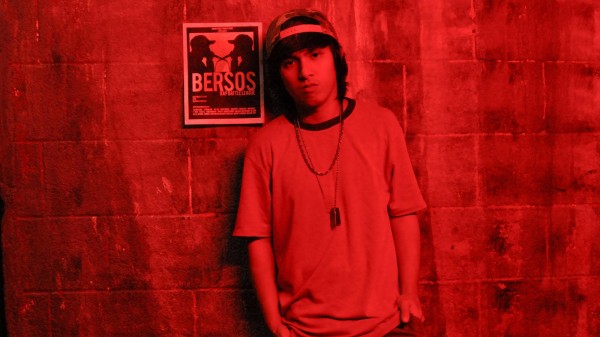
ABRA IN RESPETO
The Philippines seeks a voice and finds a cycle of violence
Respeto begins as a hiphop coming-of-age movie, a sort of Filipino Eight Mile whose protagonist, Hendrix (Abra), comes from the very poor down-and-dirty world of the Pandacan slums, the underside of Manila, in which underground rap is the new anthem-maker. But first time filmmaker Alberto Monteras II has things to say about every aspect of the Philippines. Rap is only one voice of a story about politics and society. The oppressive Duterte regime is awakening in older Filipinos horrifying memories of the days of Marcos' dictatorship they thought they had gotten rid of. Monteras and his cowriter Njel De Mesa weave this movie into a powerful myth of ongoing conflict and cruelty.
Petty crime brings Hendrix close to Doc (Dido De La Paz), one of those older Filipinos, a bookseller and protest poet during Marcos, whom Hendrix first tries to rob and then adopts as a mentor. It turns out Doc was a practitioner of balagtasan, a Filipino art of debate conducted in verse, so he was a kind of ancestor rapper.
Hendrix lives with his sister Connie (Thea Yrastorza) and her boyfriend Mando (Brian Arda), and robs the latter to have money to enter the big local "Versus" rap contest, the movie's first big noisy vérité scene, since like Eight Mile, real rappers are used. He goes first, so we know he's going to lose. He fails miserably, trying to better a large female rapper opponent Luxuria with crude fat jokes. She easily destroys him and he is so daunted he pisses himself, which makes him notorious.
Then with his sidekicks Betchai (Chai Fonacier) and Payaso (Yves Bagadion) he conceives the idea of robbing Doc to repay his sister's boyfriend. Thus another world enters his life. The movie is in no hurry. Gradually it emerges that 'Drix's sister and boyfriend are selling drugs and use him as their runner. Getting to know Doc through repairing damage they cause breaking in, Hendrix steals a notebook of poetry and uses lines for his raps. But Doc, who may have early stage dementia, and turns out to have suffered traumatically under Marcos, is watching Hendrix and sees worth in him.
As we learn more about Doc he reveals that his family was abused by Marcos' government thugs and though he smashed one of them in the head with a rock, it felt ineffectual. A parallel was struck early on when at a club Hendrix sees his love Candy (Kate Alejandrino) raped by his perfidious rival Breezy G (Loonie) and can do nothing to stop it. And this mirrors the nation forced to watch impotent as two brutal regimes wreck havoc. In this context while rap contests like Versus are clearly a place where the urban poor can raise a loud voice, they're not seen as saving anything but instead, like the current regime, only play with more conflict, the drug lords bringing awful violence, and the vicious cycle going on.
Sometimes Respeto seems mired in the vulgarity and crude humor of a third world B-picture. On the other hand local reviewers fall into the airy generalizations of a term paper. It's hard to explain how Monteras welds mud into a meaningful shape, and his movie is so deeply vernacular no outsider can appreciate the message of its constant wordplay. But imperfect as it is, Respeto has more meaning and emotion in it than other more polished entries in the festival, and means a great deal to many Filipino viewers.
From Susan Claire Agbayani in Rappeler we learn that "National Artist for Literature Bienvenido Lumbera, and poets Vim Nadera (who had a cameo in the Balagtasan scene in the movie), Frank Rivera and Mark Angeles contributed poems to the film," as well as that actual Filipino rappers Mike Swift, Apekz, Abbaddon, J Skeelz, Mike Kosa and M-Zhayt and female rap artist Luxuria" perform in the Versus scenes speaking their own lines.
This feisty little movie won several awards including Best Picture at the Cinemalaya Philippine Independent Film Festival and received a ten-minute standing ovation Aug. 2017, and was released theatrically in the Philippines in Sept. 2017. It surprised and pleased the filmmakers by also winning awards at Cyprus, and it gained more international attention with a Rotterdam screening. It was screened for this review as part of NYAFF, where it shows at 7:30 p.m. on 14 July 2018.
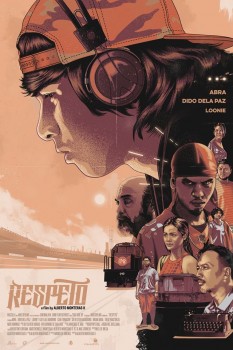
Poster by V.Aseo and M.Lazarte (from Esquire)
Last edited by Chris Knipp; 06-29-2018 at 05:01 PM.
-
River’s Edge Isao Yukisada (2018)
ISAO YUKISADA: RIVER'S EDGE (2018)F
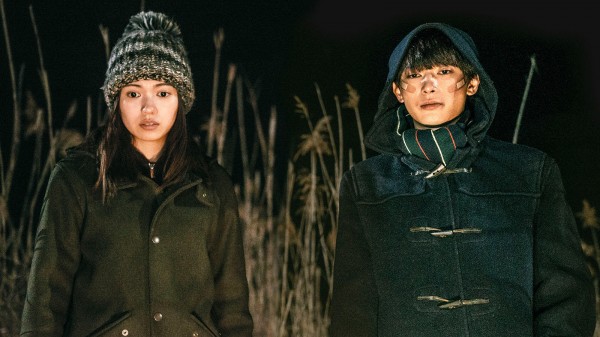
FUMI NIKAIDO AND RYÔ YOSHIKAWA IN RIVER'S EDGE
Angsty and chic Japanese high school drama set in 1994
Ichiru Yamada (Ryô Yoshizawa) is the formerly bullied, closeted gay friend of Haruna, the main character (Fumi Nikaido), whose dreams of UFOs doubtless owe something to Gregg Araki's Mysterious Skin , but everything in Isao Yukisada's River's Edge is adapted from a popular manga strip by Kyoko Okazaki. This must explain its appeal to an adolescent audience and also the shallowness of the characters. The title, "Ribâzu ejji" in the original, a transliteration of the English, references the more tightly plotted 1986 American movie that helped bring Crispin Glover and Keanu Reeves to public notice. Perhaps this is nostalgic for Japanese forty-somethings? The veteran director Isao Yukisada is now 49.
Ichiiru is still bullied, because Haruna rescues him locked naked in a locker. His victimizer is her own boyfriend, the tall, longhaired wild boy Kannonzaki (Shuhei Uesugi). There is also Kozue Yoshikawa (Sumiru), a bulimic classmate who is in TV ads. Ichiru dates the naive Kanna (Aoi Morikawa), who's unaware that he's gay, just thinks he's "fashionable and mysterious" (using the English word 'mysterious'). Only Haruna knows. Kannonzaki is having sex and snorting coke with the class slut, Rumi (Shiori Doi) - leading to a couple of surprisingly graphic sex scenes. The sequence where Ichiru takes Haruna out into the high grass to show her the decayed corpse he has discovered a year or so ago, having shared this secret earlier with Yoshikawa (they call each other by last names), may evoke Gregg Araki. Araki's Apocalypse Trilogy is more vivid, more fun, but less cool and chic than River's Edge. This film has a ghoulish side, but is also funny; it makes sense to call it a "tragicomedy."
These are Tokyo sophisticates, yet the atmosphere, the "river's edge" being rough and industrial, is also rather seedy. Rather than developing a coherent plot (though there is plenty of action 3/4 of the way through), the manga narrative seems more designed to show what urban Japanese high schoolers were up to in the Nineties, which could be a revelation for the younger and more naive, and titillation for the older who may have missed out on some of this, or anyway are past it now. But no one would want to be up to all these things, which are both idiotic and terrible. We are witness to crimes. It's manga.
River's Edge / リバーズ・エッジ ("Ribâzu ejji"), 118 mins., debuted in the Panorama section of the Berlinale 15 Feb. 2018 and opened in Japan the next day. It also had festival showings at Hong Kong, South Korea's Jeonju International Festival and Nippon Collection in Germany. It was screened for this review as part of the 2018 New York Asian Film Festival, where it shows 3 Jul. 2018 at 6:30 pm. Jonathan Romney wrote a Screen Daily review from Berlin.
Last edited by Chris Knipp; 07-16-2018 at 11:25 PM.
 Posting Permissions
Posting Permissions
- You may not post new threads
- You may not post replies
- You may not post attachments
- You may not edit your posts
-
Forum Rules





 Reply With Quote
Reply With Quote








Bookmarks